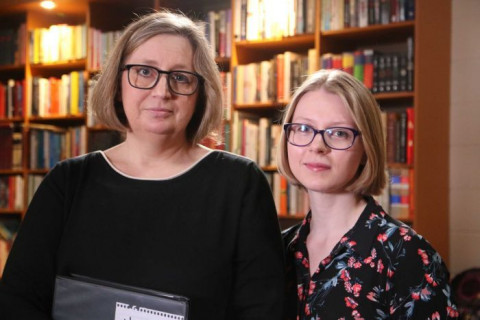
Helen Campbell knows the risk her daughter Annie poses to the community because she has experienced it herself.
Key points:
- Annie Campbell has complex care needs
- Her mother says she has struggled to find carers willing to work with her
- The NDIA says it is working with the family to find a solution
In 2013, a small change to Annie's routine during a tenpin bowling excursion resulted in a violent meltdown.
"She headbutted me, really hard, she knocked my front two teeth out — they were capped and the caps came off — and my left eye was swollen shut and blackened," Ms Campbell said.
Annie, 26, is severely autistic, epileptic and can experience psychosis after seizures.
Her needs have been deemed so complex, that the South Australian Government has funded two carers at once to look after her in recent years.
Despite current funding through Disability SA, Ms Campbell and her eldest daughter Lisa have struggled to find agencies or carers willing to take Annie on a long-term basis.
She is worried this will only be more complicated when her daughter transitions to the National Disability Insurance Scheme (NDIS) at the end of June.
"It's been really difficult to try and sell my daughter to people to make it palatable to people," Ms Campbell said.
She said carers often do take Annie on, only for an incident to occur that scares them off.
"Annie pulled [a carer] around the hospital room by her hair, and she had an injury and decided after that she couldn't return," she said.
Ms Campbell also said Annie had hit nurses who made WorkCover SA claims during a year-long stay in hospital, which ended last year.
'I delayed putting my lawyer hat on'
Ms Campbell has 25 years of experience working as a lawyer, including running her own family law firm in Adelaide.
Even with her qualifications, she said trying to negotiate funding for Annie through the transition to the NDIS had been extremely difficult.
She said she still felt like she had "no idea" what was going on.
"I have delayed taking my mother hat off, and putting my lawyer hat on, because I hoped it wouldn't be necessary," she said.
"I do despair for people who don't have, at any point in the process, the option to put on a hat, where they can read the cases and they can read the legislation.
"I'm most worried about people like Annie, who don't have an advocate, who can't even speak."
She said she had applied for extra NDIS funding in Annie's care plan to adequately train and support carers who might take her on.
"It seems to me to be a very critical component to managing Annie's team, to even attract people to the roles," she said.
"To indicate to them, that in their role, they will be given adequate support, seems an essential part to asking someone to engage in work that is risky for them."
 Photo: The NDIA said it was working with the Campbell family to finalise Annie's NDIS plan. (ABC News: Nicole Mills)
Photo: The NDIA said it was working with the Campbell family to finalise Annie's NDIS plan. (ABC News: Nicole Mills) She said despite detailed evidence and reports from multiple professionals, funding for carers to attend specialist training to help them look after her daughter was virtually non-existent.
When she raised it with officials, Ms Campbell said she was told if the plan failed, and Annie was sent to hospital, that would be a way to save money for carer training, as her care would be paid for by the State Government's Department of Health.
She said Annie's NDIS funding plan also contained thousands of dollars for psychologists that she did not ask for.
Ms Campbell's daughter Lisa said the lack of transparency and communication about the allocation of funding was disappointing.
"There needs to be more accountability to justify the decisions they make, because these decisions are important," she said.
However, the National Disability Insurance Agency (NDIA) — the independent agency delivering the NDIS — said it was working to finalise the plan before June 30.
That is the deadline for most people receiving state disability funding to move to the national scheme.
"The NDIA is working with the Campbell family to finalise Annie's NDIS plan as a priority so that Annie can receive the support she needs," an NDIA spokesperson told the ABC.
Multiple agencies unable to take on client
Ms Campbell said the search for carers to take Annie on had become almost futile without extra funding for training and support.
She said 21 disability agencies had knocked her back over the past 15 months.
The NDIS families desperate for a better scheme

One Adelaide mother was left feeling "absolutely awful" after a review of her eight-year-old son Samuel's funding NDIS plan.
She felt the transition to the NDIS was creating "market failure" where agencies could not provide services, even for those who had funding to offer.
Chief executive of disability care provider Community Living Australia Mark Kulinksi agreed the administrative demands of transitioning existing clients to the NDIS by the deadline meant agencies did not have the capacity to take on difficult clients.
"Particularly those clients with complex care needs, sometimes they wait to the last minute so they can get existing clients across the line," he said.
"On average across SA, 50 per cent of people's plans are being utilised. That means only 50 per cent of the money that's being allocated to them is being used.
"Some of that is not being utilised because they can't find a therapist."
from https://www.abc.net.au/news/2019-05-29/lawyer-cant-navigate-ndis-for-da…
Note: A4 has repeatedly raised concerns over the NDIS's failure/refusal to address workforce issues.

